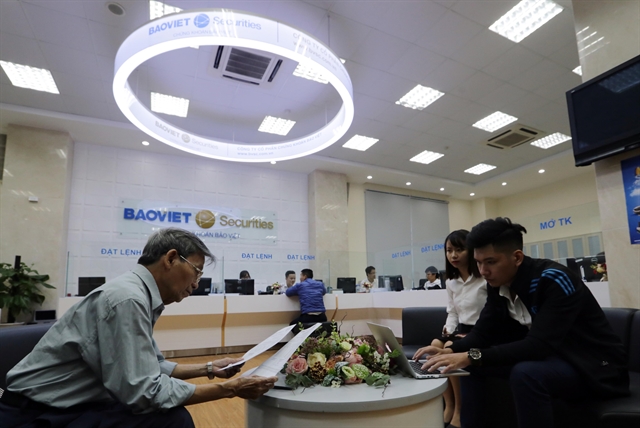 Economy
Economy

 |
| Investors at a transaction office of Bảo Việt Securities Company. — VNA/VNS Photo |
HÀ NỘI — After logging another losing week, the Vietnamese stock market is expected to receive support from the low interest rate environment and the third quarter business results in the next few weeks, said experts.
On the Hồ Chí Minh Stock Exchange (HoSE), the VN-Index closed the last session at 1,128.54 points, while the HNX-Index on the Hà Nội Stock Exchange (HNX) was traded at 230.45 points.
The market experienced a bumpy road with consecutive correction and recovery sessions.
For the week, both indices fell for the fourth week in a row, of which the former declined 2.22 per cent and the latter dropped 2.5 per cent.
Liquidity on the southern bourse reached more than VNĐ73.3 trillion (US$3 billion) last week, down 21.2 per cent from the previous week.
The liquidity on HNX also decreased by 17.3 per cent to VNĐ8.74 trillion.
The decline in both liquidity and the indices shows that selling pressure has gradually eased over the last week, and the market has recovered positively at an area of around 1,105 points.
Đinh Quang Hinh, head of Macro-economics and Market Strategy Department of VNDirect Securities Corporation, said that the Vietnamese stock market has experienced a strong adjustment in recent weeks. Rising exchange rate pressure and the central bank’s move to issue Treasury bills to absorb excess liquidity were attributed to the losses.
As a result, many investors were concerned that the scenario of last October, which was the reversal of monetary policy due to increased exchange rate pressure, would repeat.
However, Hinh said that this year's situation is much different from last year. Last year's strong fluctuations came from a combination of many factors, such as exchange rate pressure and bond issuance violations at Vạn Thịnh Phát Group, which triggered liquidity tightening in the banking system, forcing the State Bank of Việt Nam to raise operating interest rates.
In contrast, at present, the banking system's liquidity is very abundant and even surplus due to weaker-than-expected credit growth.
This year, the exchange rate is also supported by abundant supply from the trade surplus.
In the first nine months of 2023, the country had a trade surplus of $21.68 billion, while that of last year was only $6.76 billion.
Moreover, FDI and remittances remained positive, with foreign currency supply supplemented by numerous deals with foreign investors.
Therefore, Hinh expected that this year's exchange rate pressure would not reverse the central bank’s loosening monetary policy. Mobilisation and lending interest rates are likely to remain at low levels to support the recovery of the economy.
In the coming weeks, the market will probably be lifted by information about the third-quarter business results of listed companies.
According to VNDirect, the picture of the last quarter’s business results will be more positive than the first two quarters of the year and will be a supporting factor for the market.
Analysts from Saigon - Hanoi Securities JSC (SHS) said that the domestic macro-economy is generally showing more bullish signals, with GDP on track to recover its growth momentum but not meeting expectations.
Globally, there are still many uncertainties, such as that global economic growth is low and the risk of recession is persistent in some countries and regions, while global inflation remains high and the tightening policies in many countries do not show signs of ending soon.
"With the current macro situation, if the market slows down to continue to accumulate and wait for the next macro movements, it is also an appropriate move," SHS said.
Given these factors, expert Phạm Bình Phương expects the VN-Index to find equilibrium at the 1,100 point-level and begin a recovery trend. Investors will pay attention to the short-term milestones of 1,030-1,040 points and 1,060-1,070 points. — VNS




